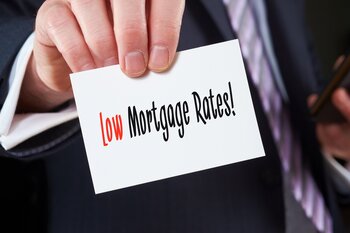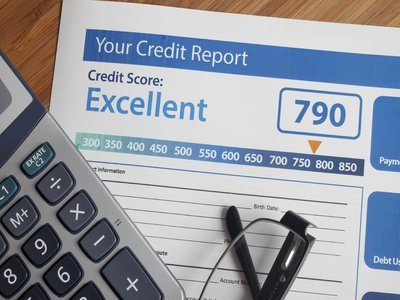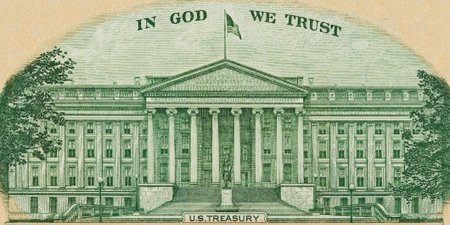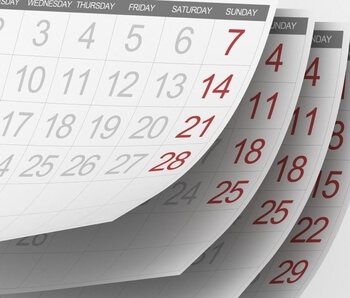Buying a home? 15 ways to shop for the lowest mortgage rates
 When purchasing a home, shopping for the lowest mortgage rates is an essential strategy that can save you thousands of dollars over the life of the loan.
When purchasing a home, shopping for the lowest mortgage rates is an essential strategy that can save you thousands of dollars over the life of the loan.
For the best results, shop with a plan. Do enough upfront research to have an idea of what you want, then see who can get it for you.
Here are some strategies to shop and qualify for the best mortgage rates:
No. 1: Establish a baseline
 If you've never bought a home before, get a referral from someone you trust and contact that lender to obtain your credit score and discuss your loan options. This initial contact can help you compare FHA and conventional financing choices, including loan terms and features so you can make an informed decision on which loan program and term you want before you contact other lenders. This lender may be your first stop, but it shouldn't be your only one.
If you've never bought a home before, get a referral from someone you trust and contact that lender to obtain your credit score and discuss your loan options. This initial contact can help you compare FHA and conventional financing choices, including loan terms and features so you can make an informed decision on which loan program and term you want before you contact other lenders. This lender may be your first stop, but it shouldn't be your only one.
No. 2: Raise your credit score
 Conventional mortgages carry a higher interest rate for lower credit scores, so raising your score can help you qualify for lower rates.
Conventional mortgages carry a higher interest rate for lower credit scores, so raising your score can help you qualify for lower rates.
Most lenders require a minimum credit score of 620 to 640. "Typically, a credit score of 780 or higher puts borrowers in the best tier for a conventional loan program," says Michael Smith, first vice president – business development manager for mortgage lending for California Bank and Trust in San Diego. Lenders use "risk-based loan pricing" to determine the interest rate that your financial profile fits. If your credit score is low, your best rate may be available in an FHA-backed loan, as the program doesn't penalize you for a lower score.
How much can a great credit score improve your interest rate?
No. 3: Decide how long you'll keep the loan
 This is important because it can change the kind of mortgage you choose. For example, if you are risk-averse you might choose a fixed-rate home loan for maximum safety. But in fact, if the property will only be kept for a few years, you can be perfectly safe with a 5-year hybrid adjustable-rate mortgage -- and may get an interest rate that one-half to one percent lower than a 30-year fixed-rate mortgage. On a $400,000 mortgage, that difference in the interest rate is over $250 a month, saving about $20,000 in interest over the first five years of the loan.
This is important because it can change the kind of mortgage you choose. For example, if you are risk-averse you might choose a fixed-rate home loan for maximum safety. But in fact, if the property will only be kept for a few years, you can be perfectly safe with a 5-year hybrid adjustable-rate mortgage -- and may get an interest rate that one-half to one percent lower than a 30-year fixed-rate mortgage. On a $400,000 mortgage, that difference in the interest rate is over $250 a month, saving about $20,000 in interest over the first five years of the loan.
Indeed, shorter loan terms can get you a lower rate. While the spread between mortgage rates for loan terms vary, Tierce says that generally, 20-year fixed mortgage rates are about one-eighth percent lower than interest rates for a 30-year fixed, and 15-year fixed-rate loans are one-quarter to three-eighths percent lower than 30-year fixed-rate loans.
"You can save thousands on interest payments with a shorter loan term, although you have to make sure you can handle the higher payments," says Mark Fowler, executive vice president of business development at The Futures Company in Chapel Hill, North Carolina.
You don't need a precise estimate of how long you'll expect to be in the loan you choose, but a working figure can be useful. If you're buying a one-bedroom condo and expect to be starting a family in a few years, it's a reasonable bet that you won't be in the loan you choose for the long run, as you're likely to sell and move on.
It's also worth considering that if mortgage rates are relatively high when you buy your home that you may refinance to a new loan in the not-too-distant future, too.
Considering an ARM? Read HSH's Comprehensive Guide to Adjustable Rate Mortgages
No. 4: Contact a mix of financial institutions
 Interest rates fluctuate constantly for a variety of reasons, including the occasional promotion of a particular loan product by a financial institution. For example, some lenders who are eager to generate more purchase loans might offer the best mortgage rates for homebuyers rather than refinancing homeowners, says Brian Martucci, a mortgage lender with GetLoans.com in Washington, D.C. Sometimes a credit union or bank will introduce a new loan product and offer better mortgage rates in order to entice borrowers, says Craig March, a branch manager with Inlanta Mortgage in Janesville, Wisconsin.
Interest rates fluctuate constantly for a variety of reasons, including the occasional promotion of a particular loan product by a financial institution. For example, some lenders who are eager to generate more purchase loans might offer the best mortgage rates for homebuyers rather than refinancing homeowners, says Brian Martucci, a mortgage lender with GetLoans.com in Washington, D.C. Sometimes a credit union or bank will introduce a new loan product and offer better mortgage rates in order to entice borrowers, says Craig March, a branch manager with Inlanta Mortgage in Janesville, Wisconsin.
The kind of loan you're looking for can help dictate where to look. While almost all lenders will offer conventional conforming loans, mortgage bankers tend to also specialize in FHA loans, depository institutions like banks and credit unions often feature ARMs on their mortgage menu, and there are VA- and USDA loan specialists in most markets, too.
"It's best to diversify and try a mix of places such as a direct lender, a regional bank, a credit union, a community bank and a national bank," says March.
No. 5: Make a larger down payment
 The larger your down payment, the deeper your initial equity stake, thus the less risk you pose to the lender.
The larger your down payment, the deeper your initial equity stake, thus the less risk you pose to the lender.
While the difference in interest rate for larger or smaller down payments can be subtle, every little bit can help save you money over time. A larger down payment also can mean a smaller loan amount, and for conventional loans, the ability to cancel private mortgage insurance sooner, helping improve your budget down the road. If you can muster it, a down payment of 20% or more means that you won't need PMI at all.
Low- and moderate-income home buyers may be able to take advantage of state-backed homebuyer downpayment assistance programs.
No. 6: Purchase a single-family home
 Among other reasons, condominiums are considered a riskier investment for lenders because they dropped in value more than other types of homes during the housing crisis, says Tierce, so mortgage rates are usually one-eighth percent higher than for a single-family home.
However, if you make a down payment of at least 30 percent, that interest rate add-on will likely not be charged.
Among other reasons, condominiums are considered a riskier investment for lenders because they dropped in value more than other types of homes during the housing crisis, says Tierce, so mortgage rates are usually one-eighth percent higher than for a single-family home.
However, if you make a down payment of at least 30 percent, that interest rate add-on will likely not be charged.
Fannie Mae and Freddie Mac tightened rules regarding condo loans to help ensure that buildings have had proper maintenance and inspections and condo associations are in solid fiscal shape to address issues as needed, so a mortgage for a condo loan may carry some additional paperwork and expense.
Considering your options, but having trouble deciding what's right for you? Read "Solving the condo or house dilemma".
No. 7: Be prepared to answer some questions
 Martucci says every borrower must be prepared to answer the following questions before lenders can provide an accurate rate quote:
Martucci says every borrower must be prepared to answer the following questions before lenders can provide an accurate rate quote:
- What's your credit score? Your credit score is one of the key influences in the interest rate you'll be charged for your mortgage.
- How large is your down payment? Interest rates vary according to your loan-to-value ratio.
- Are you buying a single family home or a condominium? Martucci says a borrower purchasing a condominium with a loan to value above 75 percent will pay a one-eighth to one-quarter percent higher interest rate.
- Do you intend to waive escrow and pay your taxes and insurance yourself? If so, your mortgage rate could be one-eighth of one percent higher because that's considered a riskier loan, says Martucci.
No. 8: Do your own research
 You can shop in person, by phone, or online with mortgage lenders. What you don't want to do is just mindlessly go with whatever lender your real estate agent recommends -- even if you like that person. You still owe it to yourself to compare interest rates and negotiate your best deal.
You can shop in person, by phone, or online with mortgage lenders. What you don't want to do is just mindlessly go with whatever lender your real estate agent recommends -- even if you like that person. You still owe it to yourself to compare interest rates and negotiate your best deal.
Take notes of where you obtained rate quotes, from whom, and when. You can even use a handy mortgage-shopping worksheet, or ask lenders to provide you with a Loan Estimate disclosure form. Note, however, that a lender isn't required to provide you an LE form until you actually place an application, but some may do so if asked.
No. 9: Ask about fees
The various fees associated with a loan are one reason why you shouldn't comparison shop solely based on the best advertised rate. Sometimes an advertised rate can be lower than all the rest because of all the fees associated with it.
"Some lenders blend all their fees into a loan preparation fee, while others separate them out, so be sure to ask for the total amount it will cost to close the loan," says Martucci.
Generally, a mortgage with higher fees should have a lower interest rate, says March.
Whether a lower rate/higher fee loan or a higher rate/lower fee loan is right for you depends on a number of things, including how much cash you want to dedicate to your down payment and closing costs, how long you think you'll stay in this mortgage and whether or not you'll want or need to buy down the interest rate to make qualifying easier.
No. 10: Always provide the same information
 Make sure when you request a rate quote that you provide all lenders with the same information:
Make sure when you request a rate quote that you provide all lenders with the same information:
• The quality of your credit
• The location, type, and use of your
property
• Size of your down payment
Keep in mind that mortgage rates change often, so quotes obtained today can't be reliably compared against quotes given tomorrow.
No. 11: Contact lenders on the same day
 Mortgage rates fluctuate constantly, so you should call lenders as close to the same time as possible on the same day to compare the best mortgage rates, says Martucci.
Mortgage rates fluctuate constantly, so you should call lenders as close to the same time as possible on the same day to compare the best mortgage rates, says Martucci.
"If possible, call within the same timeframe, because a bond rally could mean that mortgage rates have dropped dramatically from the morning to the afternoon," he says. Of course, the reverse can also be true, too.
Related: What moves mortgage rates? (The Basics)
No. 12: Interview lenders and decide
 Contact the mortgage lenders and notice who gets back to you right away. Pay attention to who asks you questions about your situation, and who answers your questions in an understandable and meaningful way. See who you feel most comfortable with when discussing your financial concerns. At this point, you already know their mortgage rates are competitive, so trust your gut and go with the person you feel best about.
Contact the mortgage lenders and notice who gets back to you right away. Pay attention to who asks you questions about your situation, and who answers your questions in an understandable and meaningful way. See who you feel most comfortable with when discussing your financial concerns. At this point, you already know their mortgage rates are competitive, so trust your gut and go with the person you feel best about.
No. 13: Don't comparison shop by APR

There are lots of ways to shop for a mortgage, but comparison shopping by APR (Annual Percentage Rate) is among the worst of them.
It's a government-mandated figure meant to show the "true cost" of financing a home over a period of 30 years. However, "true cost" is really equal to your loan size plus the interest paid over 30 years (assuming you're getting a 30-year, fixed-rate mortgage), plus closing costs required for the loan. To better understand APR, you'll want to check out "What APR doesn't tell you".
No. 14: Know when you want to close

The length of your lock-in period will impact your mortgage rate, so discuss your target close date with each lender and ask what they charge for different loan-lock periods.
The best time to close a mortgage can depend on a number of factors, including the seller's timeframe and schedule for vacating the property.
"Make sure you tell the lender when you expect the closing to be because you want to lock-in the interest rate for the right length of time," says Mark Richards, a senior mortgage loan officer for Citizens One Home Loans in Washington, D.C. "Many lenders charge one-eighth percent more if you must lock-in the loan for 60 days. If you need a 90-day loan lock your interest rate could be as much as one-third percent higher."
No. 15: Decide if you'll pay points
 One of the largest fees by far can be the points attached to a particular loan. Each point is equal to one percent of your loan amount.
One of the largest fees by far can be the points attached to a particular loan. Each point is equal to one percent of your loan amount.
"You need to make sure you discuss with each lender how the loan will be structured in terms of whether you are paying points or not," says March. The question you need to ask is "Should I pay points to lower my mortgage rate?"
If you intend to stay in your home for the long term, such as 10 years or more, you may want to pay points in order to keep your interest rate as low as possible for the life of your loan. If you plan to sell in a few years, paying a lot of cash up front to pay points may not be worth it, says Richards. A lender can show you the difference in interest and monthly payments in order to decide whether or not it's worth it to pay points. Even if your time frame is shorter, there can still be times when paying points makes sense, such as being able to qualify for a larger loan amount.
"Depending on the lender, paying one point will reduce your mortgage rate by one-quarter percent," says Richards. "On a $200,000 loan, you'd pay $4,000 to bring down your rate 0.5 percent. You'd only save around $4,000 in the first 10 to 11 years, but you'd save $40,000 over the life of the loan with that lower rate."
You can also use HSH.com's Closing Cost Calculator to figure out if paying points is worth it.
Shopping for the best mortgage rates and the best overall mortgage for you and your financial situation is not an easy task, but these 15 tips should help steer you in the right direction.
Bonus Reading: HSH's Ten Best Ways to Improve Your Mortgage Experience
This article was updated by Keith Gumbinger.